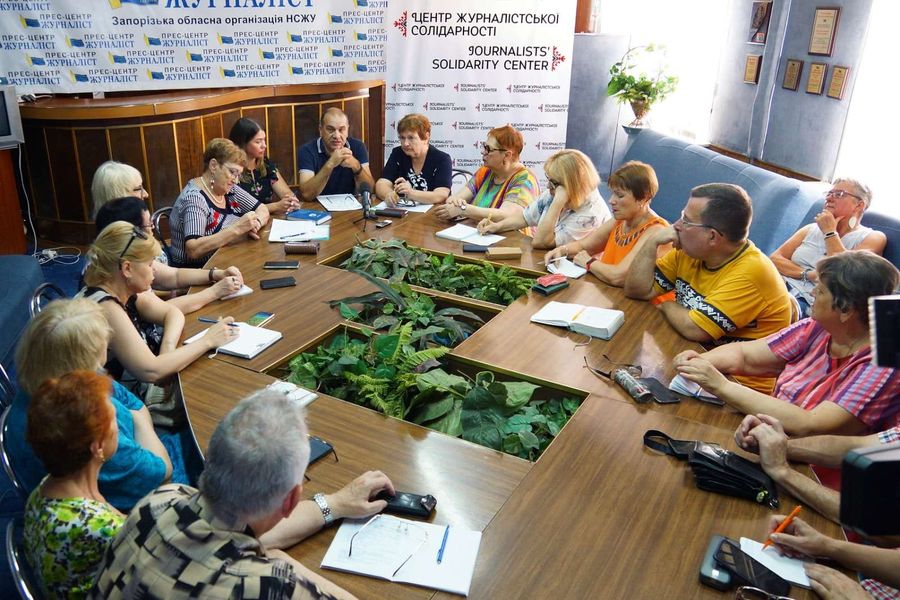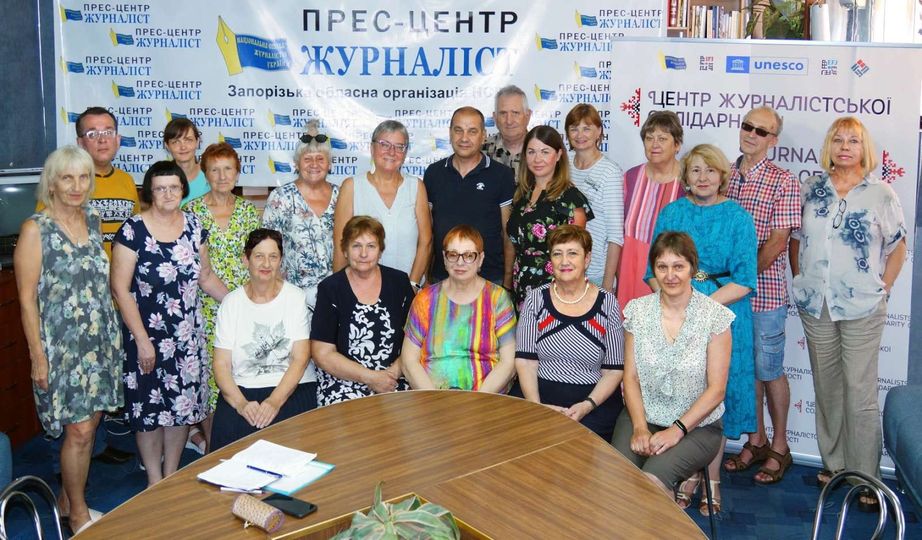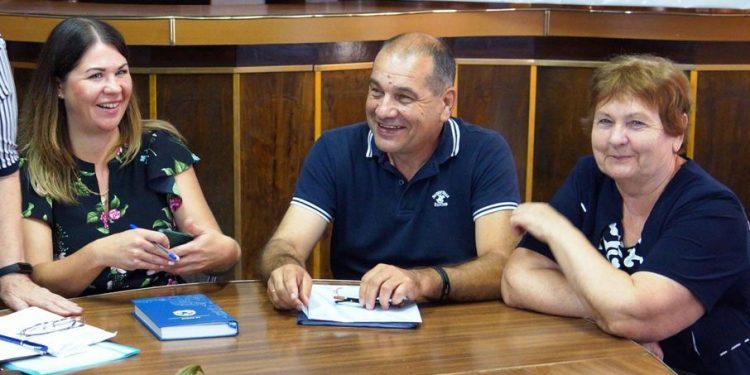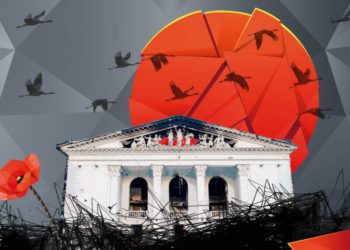“Many of us, displaced journalists, were left without a home or with houses and apartments completely destroyed. Such a situation is definitely very difficult. But now, the main goal is victory. Later, we will be able to rebuild and restore everything. We can imagine what a huge amount of work will have to be done in our communities,” noted journalist Tamara Kurochkina from the front-line city of Orikhiv.
She said this at a press conference, hosted by the Zaporizhzhia Journalists’ Solidarity Center (JSC) of the National Union of Journalists of Ukraine (NUJU) and dedicated to the activities of communities in the front-line and de-occupied territories, its participants discussed challenges appearing before the local self-government bodies during the russia’s full-scale invasion of Ukraine and in the upcoming post-war period.
The participants in the press conference and speakers were the head of the Zaporizhzhia regional branch of the Association of Ukrainian Cities (AUC)and Polohy City Mayor Yurii Konovalenko; the executive director of the regional branch of AUC Tetiana Voshchynska; and consultants of the branch, as well as Zaporizhzhia media and displaced journalist from front-line and occupied communities of Orikhiv, Huliaipole, Enerhodar, Berdiansk, Yakymivka, etc. Issues were discussed using examples of the life and activities of specific territories.
Talking about the reconstruction in the territories of the front-line and de-occupied communities, Tetiana Voshchynska emphasized that serious work has already begun to prepare for the reconstruction of the social and housing structure in these territories.
Yurii Konovalenko spoke about the results of the work of the Board of the AUC, which currently encompasses 1,031 communities. And taking into account the state of war, its role in the coordination of work and the exchange of experience and protection of the rights of local self-government has noticeably increased.
The release of leaders and employees of local self-government bodies from captivity remains an important task. Four heads of communities are still being held captive by the Russian invaders. Among them is Yevhen Matvieiev, the mayor of the Dniprorudne City Council, who has not been able to return home since March 13. Therefore, at the meeting of the board of the AUC, an appeal was adopted addressing the President of Ukraine, the Human Rights Commissioner of the Verkhovna Rada, the Security Service of Ukraine (SSU), the Main Department of the Ministry of Defense, the Defense Intelligence of the Ministry of Defense, the Coordination Headquarters for the Treatment of Prisoners of War, and the United Center for the Coordination of Searches and the Release of Those Illegally Deprived of Liberty as a Result of Aggression against Ukraine with a request to facilitate the return of kidnapped colleagues. The most unfortunate thing is that they do not fall under the status of prisoners of war; they cannot be exchanged. It is difficult to imagine the conditions these community leaders are kept in.
Speakers, together with journalists, discussed a number of other important issues, in particular, the preparation for the heating season and, therefore, gas bills. The government promises to prevent an increase in heating tariffs for the population. But some of the tariff components have increased, in particular, by 40% – the cost of electricity. Also, a big problem is heating networks’ gas debts arising due to an economically unjustified tariff difference. So, AMU analysts prepared a draft resolution for the government on compensation for the tariff difference. There is hope that in the near future, it will be approved at a meeting of the Cabinet of Ministers, and communities will be compensated for the difference. AMU’s position is that the gas price for the population and budget institutions should remain frozen.
The participants in the press conference also discussed the issue of shelters. The state and communities were unprepared to protect people from shelling, bombings, and radioactive threats. Now, building and equipping shelters is a must. The state allocated the funds. Unfortunately, they are not enough, but all the more, every penny must be used efficiently and quickly. Communities are now engaged in this.
Media workers also expressed their concern over the redistribution of territories and the unification of a number of communities after the war. After all, many villages have been completely destroyed, are small in number, and are unlikely to recover. And some communities were created based on political rather than economic expediency. The speakers of the press conference are sure that it is necessary to optimize and reorganize territorial communities based on economic principles only. Then each of them will be able to become capable and successfully solve the issues of life and well-being of its residents.
“It was the issue of community capacity that worried me the most. Because there are examples in our district: one village equals one community. The material base is weak; there are practically no working enterprises and, therefore, taxes. Many residents are pensioners. And the total number of the population did not meet the norms of the reform. Where to get funds for development to support life activities? It is good that after the war, we will correct these shortcomings, and the territories will be able to develop stably. They also discussed what journalists should do in this direction at this meeting. We thank the Zaporizhzhia JSC of the National Union of Journalists of Ukraine (NUJU) and the regional branch of AUC for organizing such an event,” says journalist Nina Derkach, born and raised in Huliaipole.
Call the Zaporizhzhia JSC at 096 277 5352 (Nataliya Kuzmenko and Valentyna Manzhura, the JSC coordinators). The Center’s address is 152 Sobornyi Avenue.


ABOUT JSC
The Journalists’ Solidarity Centers is an initiative of the NUJU implemented with the support of the International and European Federations of Journalists and UNESCO. The initiative is designated to help media representatives working in Ukraine during the war. The Centers operate in Kyiv, Lviv, Ivano-Frankivsk, Chernivtsi, Zaporizhzhia, and Dnipro and provide journalists with organizational, technical, legal, psychological, and other types of assistance.
ABOUT UNESCO
UNESCO is the United Nations Educational, Scientific, and Cultural Organization. It contributes to peace and security by promoting international cooperation in education, sciences, culture, communication, and information. UNESCO promotes knowledge sharing and the free flow of ideas to accelerate mutual understanding. It is the coordinator of the UN Action Plan on the Safety of Journalists and the Issue of Impunity, which aims to create a free and safe environment for journalists and media workers, thus strengthening peace, democracy, and sustainable development worldwide. UNESCO is working closely with its partner organizations in Ukraine to provide support to journalists on the ground.
The designations employed and the presentation of material throughout this digest do not imply the expression of any opinion whatsoever on the part of UNESCO concerning the legal status of any country, territory, city, or area or its authorities or concerning the delimitation of its frontiers or boundaries.
The authors are responsible for the choice and the presentation of the facts contained in this digest and for the opinions expressed therein, which are not necessarily those of UNESCO and do not commit to the organization.
Valentyna Bystrova
Photo: Dariya Zyrianova and Serhii Bizhko

 THE NATIONAL UNION OF
JOURNALISTS OF UKRAINE
THE NATIONAL UNION OF
JOURNALISTS OF UKRAINE
















Discussion about this post